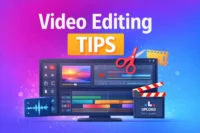Podcast Terminology Explained for Beginners
Published: 31 May 2025
Podcasting is growing fast, and whether you’re a listener or a new creator, you’ve probably come across some confusing terms. Words like “RSS feed”syndication,” or “show notes” can sound technical if you’re just starting out.
In this post, we’ll break down the most common podcast terminology in simple language. By the end, you’ll feel more confident understanding the lingo and navigating the podcasting world like a pro.

What is Podcast Terminology?
Podcast terminology is the collection of terms, phrases, and industry jargon used in the podcasting world. It includes words related to the recording, editing, publishing, and distribution of podcasts. For someone new to podcasting — whether as a listener or a creator — these terms can sound confusing at first. However, understanding them is key to fully enjoying podcasts or running your own show successfully.
Think of podcast terminology as the “language of podcasting.” Just like any profession or hobby, podcasting has its own vocabulary. From technical audio editing tools to publishing platforms and listener engagement metrics, each term has a specific purpose that helps keep things organized and efficient. podcast meaning in Urdu
- Whether you’re producing your own show or simply tuning in as a fan, learning these words can:
- Make podcast content easier to understand
- Help you follow discussions in podcasting communities or forums
- Improve your technical knowledge if you’re a creator
- Boost your confidence when using podcasting tools or platforms
- Save you time by avoiding confusion with unfamiliar terms
- Here are a few examples of commonly used podcast terms:
- RSS Feed – A file that distributes your podcast to platforms like Spotify or Apple Podcasts
- Host (Platform) – A service that stores and delivers your podcast episodes
- Intro/Outro – The beginning and ending parts of an episode, usually with music or branding
- Show Notes – Written content that describes what’s covered in an episode
- Downloads – The number of times your episode has been accessed or saved.
Common Podcast Terms Explained
Podcasting has its own set of terms that can be confusing at first, but once you learn them, everything starts to click. Below is a breakdown of the most commonly used podcast terms, grouped into categories to make them easier to understand.
🎙️ Recording & Editing Terms
- Intro / Outro – Short segments at the start and end of an episode, often with music or a voiceover.
- DAW (Digital Audio Workstation) – Software used to record and edit podcast audio (e.g., Audacity, GarageBand).
- Mono vs Stereo – Mono uses one audio channel (same sound on both ears), while stereo uses two for a fuller effect.
- Noise Reduction – A tool or effect used to remove background noise from a recording.
- Compression – An editing technique that evens out volume levels in a podcast.
📦 Publishing & Hosting Terms
- RSS Feed – A web feed that allows podcast directories (like Spotify or Apple Podcasts) to access and display your episodes.
- Podcast Host (Platform) – A service where your audio files are uploaded and stored (e.g., Buzzsprout, Podbean).
- Syndication – The process of distributing your podcast to multiple platforms via your RSS feed.
- Directory – A platform or app where listeners find and play podcasts (e.g., Apple Podcasts, Spotify, Google Podcasts).
📈 Engagement & Growth Terms
- Downloads – The number of times an episode has been downloaded or streamed.
- Subscribers – Listeners who follow your show and receive new episodes automatically.
- CTA (Call to Action) – A prompt encouraging listeners to take action (e.g., “Subscribe now” or “Leave a review”).
- Show Notes – A written summary of what’s covered in each episode, often with links and resources.
Why Knowing These Terms Matters
Understanding podcast terminology isn’t just for professionals — it’s helpful for anyone who listens to or creates podcasts. When you know the meaning of terms like “RSS feed” or “show notes,” you can better navigate podcast platforms, set up your own show, or even recommend episodes with more confidence. It removes confusion and helps you communicate more clearly in the podcasting space.
Here’s why it’s important:
✅ Helps new creators set up and manage podcasts confidently
✅ Improves communication with editors, hosts, and platforms
✅ Makes tutorials, forums, and podcast courses easier to follow
✅ Boosts professionalism for those growing a podcast brand
✅ Enhances the listening experience for curious fans.
Tips for Remembering Podcast Terms
Learning new terms can feel overwhelming at first, but with a few smart strategies, you’ll pick them up in no time. Whether you’re a new podcaster or just getting into the scene, using these tips can help you remember and apply podcast terminology with ease.
Try These Simple Tips:
📚 Create a personal glossary – Write down unfamiliar terms and their meanings as you come across them.
🧠 Use flashcards – Digital tools like Quizlet make it easy to review terms on the go.
🎧 Listen to podcasts about podcasting – Hearing the terms used in context helps them stick.
💬 Join podcasting groups or forums – Asking questions and seeing how others use the terms is a great way to learn.
📌 Bookmark helpful blog posts or YouTube tutorials – Keep your favorite resources handy for quick reference.
The Future of Podcast Lingo
As podcasting continues to grow, so does the language around it. With new technology, trends, and platforms emerging, podcast terminology will keep evolving. Understanding the basics now will help you stay ahead as the industry changes and new terms become part of the everyday conversation.
What Might Be Next:
🎥 Video Podcasting Terms – Like multicam editing, live-streaming, or overlays
🤖 AI & Automation Tools – Terms like AI show notes, voice cloning, or auto-transcription
🌍 Cross-Platform Terms – Like simulcasting (streaming to multiple platforms at once)
💼 Monetization Lingo – Such as dynamic ads, premium feeds, or branded content
🧩 Interactive Podcasting – With tools like polls, Q&A, and clickable episode chapters.
Conclusion
Understanding podcast terminology is essential, whether you’re a new listener or an aspiring creator. By learning these key terms, you can navigate the podcasting world with confidence, improve your listening experience, and even take your podcast to the next level. Podcast Terminology Explained. As podcasting continues to grow and evolve, staying familiar with its language will help you stay connected and informed.
Question:
In podcasting, what is an RSS Feed, and why is it important?
A) A software used to record and edit podcast episodes.
B) A file that automatically distributes your podcast episodes to various platforms like Spotify and Apple Podcasts.
C) A type of microphone that captures sound in high quality.
D) A service that hosts and stores your podcast audio files online.
Think carefully!
Answer:
The correct answer is B. An RSS Feed (Really Simple Syndication) is a type of web feed that automatically delivers your podcast episodes to podcast directories and apps like Spotify, Apple Podcasts, and Google Podcasts. It works like a subscription system that lets listeners receive new episodes as soon as they’re published without having to manually check for updates. Without an RSS feed, your podcast wouldn’t be able to reach most listeners because it’s the primary way episodes are distributed across different platforms.

- Be Respectful
- Stay Relevant
- Stay Positive
- True Feedback
- Encourage Discussion
- Avoid Spamming
- No Fake News
- Don't Copy-Paste
- No Personal Attacks

- Be Respectful
- Stay Relevant
- Stay Positive
- True Feedback
- Encourage Discussion
- Avoid Spamming
- No Fake News
- Don't Copy-Paste
- No Personal Attacks






